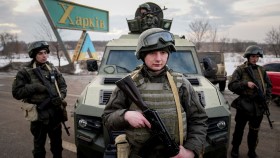Markets around the world reacted violently on Thursday as Russian troops invaded Ukraine, pushing a long-running diplomatic stalemate into a military conflict.

In the early hours of Thursday, Russian President Vladimir Putin announced a "military special operation" two days after recognizing the independence of two breakaway regions in eastern Ukraine. Reports of explosions in Kyiv and other Ukrainian cities surfaced as rockets were launched and more Russian troops were stationed on Ukraine's southern coast.
The United States and Europe have vowed to hold Russia accountable, and Western countries are preparing for more damaging and harsher punishments against Russia.
European markets fell sharply, with the Stoxx 600 falling more than 3 percent to a 2013 low and Germany's DAX down 4 percent.
Hong Kong's Hang Seng led gains, with regional stocks down 3.2%.
The Dow Jones Industrial Average fell more than 600 points in U.S. markets. The technology-weighted Nasdaq Composite lost 0.4%, while the S&P 500 lost 1.2%.
As oil prices surged, it was the first time since 2014 that Brent crude, the global benchmark, traded above $100 a barrel. Brent crude was up 6.7% at $103.25 as of about 11:50 a.m. ET, while U.S. crude futures were up 4.7% at $96.45 a barrel.
At the time of writing, the Russian ruble is trading at an all-time low of 89.89 against the dollar. However, the ruble managed to recover some of the losses. The Russian ruble currency was last traded at 87.04 rubles per US dollar. Natural gas prices also rose.
Volatility is expected to persist in the near term as policymakers calculate and disclose their reactions to the escalation.
In 2019, the EU accounted for 36.5% of Russia's imports and 37.9% of its exports, and Russia has a significant commercial interest in selling energy and commodity exports to Europe. According to Swiss banking strategists, such trade links could help reduce the likelihood of a protracted military conflict.
In these uncertain times, investors need to focus on five key strategies:
• Diversified holdings
• Use of raw materials as a political hedge
• Bet on a strong dollar
• Buy global growth winners
• Build defenses

The Fed's risk index has risen. However, that has little impact on the U.S. economy as Europe is more vulnerable to trade disruptions, tighter financial conditions and higher energy prices.
In the early hours of Thursday morning, the Moscow Stock Exchange temporarily halted all markets. The recovery was scheduled to take place at 10 a.m. Moscow time. At the time of writing, the MOEX Russia Index is down 33.3% and the RTS Moscow Index is down 39%.
Gold prices rose to their highest level in more than a year before retreating. Gold was last up about 0.8% at $1,922.30 an ounce as investors sought traditional safe havens. Soybean futures hit a record high over the same period, while wheat futures hit their highest level since 2012.
Global investors face many challenges, including supply disruptions, slower economic growth and the potential for higher energy prices.